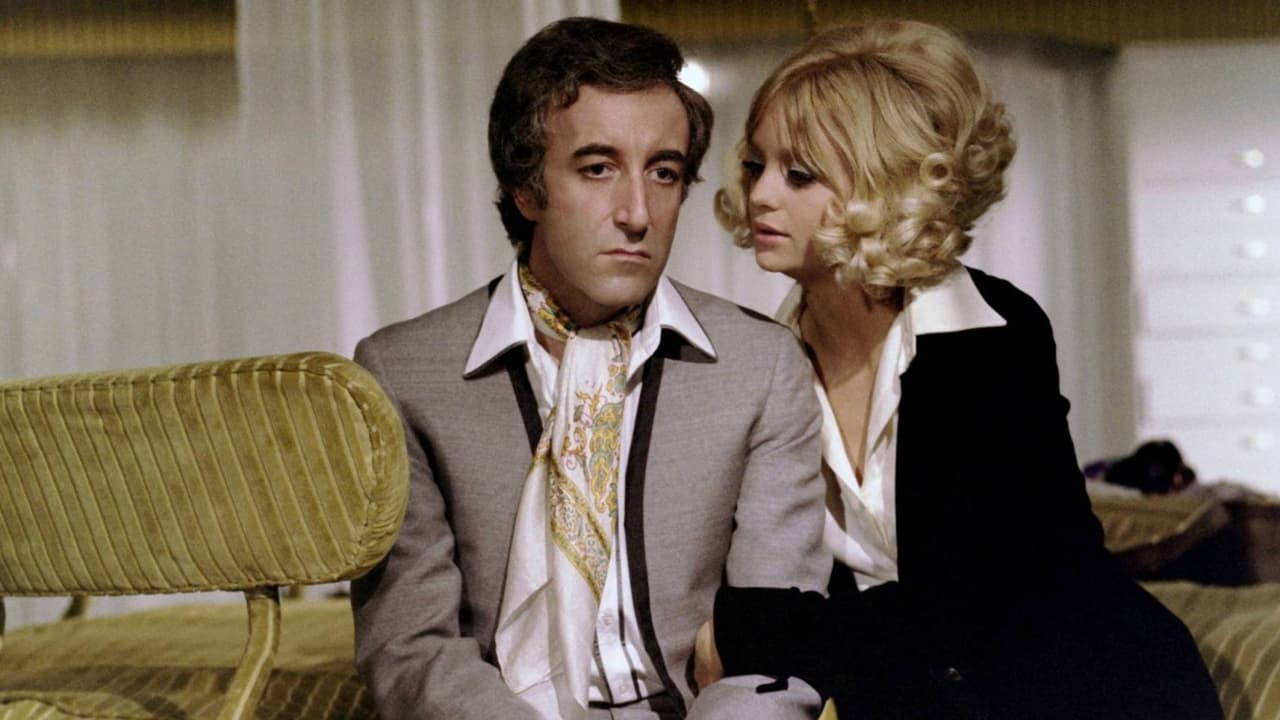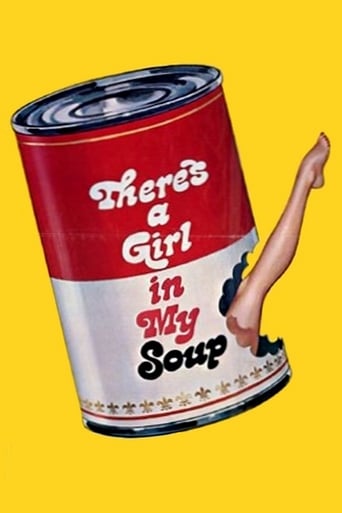

"There's a Girl in My Soup" was originally a highly successful stage play before it became a film. I have never seen the theatrical version; although it ran for six years in London's West End, from 1966 to 1972, becoming what was then Britain's longest-ever running comedy, it never seems to be revived these days. The cinematic version is a mixture of the traditional romantic comedy and the sex comedy, a genre which had become popular in the sixties.In real life Peter Sellers was never, except in his own imagination, and possibly also in Britt Ekland's imagination, a major sex symbol. Here, however, he gives a surprisingly convincing impression of one. His character, Robert Danvers, is a popular and highly successful television chef. (He was apparently based on Graham Kerr, a real-life popular and highly successful television chef). The elegantly dressed, forty- something Danvers is an incorrigible womaniser; when we first meet him he is seducing an old flame on the day of her wedding. (Mind you, given that the lady's intended is a prime example of the upper-class English chinless wonder, we can probably forgive her).Danvers is not interested on love or romance; all he wants is uncomplicated, no-strings-attached sex with as many women (preferably much younger than him) as possible. He rather looks down upon his happily married friend Andrew. He meets his match, however, when he meets Marion, a nineteen-year-old American hippie living in London. (Marion is supposed to be American, but at times it sounded as though Goldie Hawn was trying to put on a British accent). She has just split up with her Neanderthal rock musician boyfriend Jimmy, who wanted a ménage a trois with her and another girl, and Danvers assumes she will be easy pickings. To his surprise, however, she initially turns him down, but he is nothing if not persistent, and eventually succeeds in getting her into bed.Anyone familiar with the conventions of the romantic comedy will know what is coming next. For the first time in his life Robert Danvers, the Don Juan of the cooking show, falls in love with someone other than himself. Marion becomes his steady girlfriend, moves in with him, and accompanies him on a trip to a wine festival France. Even though she sometimes embarrasses him with her gauche behaviour, Robert learns to treat her as a person in her own right, not merely a vehicle for his own sexual pleasure.At this point, familiarity with the conventions of the romantic comedy ceases to be a reliable guide. We all know that, according to all the rules, the film should end with the wedding of Marion and Robert, especially as a misunderstanding has led to everyone concluding that they are married already. As I said, however, this is not a pure-bred romantic comedy but the bastard offspring of a romantic comedy crossed with that ugly beast, the sex comedy. The classical romantic comedy rule book contained no prohibition against an ending in which a lovely young woman became the bride of a man old enough to be her father. Indeed, at one time such endings were positively encouraged in Hollywood, but by 1970 they were starting to look just a bit too nineteen-fifties and out of place in the brave new world of the seventies. So an ending was contrived in which Marion returns to the ghastly Jimmy while Robert slips back into his bad old ways. When we last see him he is seducing Andrew's pretty young au pair girl.There is no real logic or motivation behind Marion's decision to abandon Robert for Jimmy, who, despite being a generation younger, is even more male chauvinist in his attitudes than the older man. This was presumably done simply to make the movie look trendier; after all, in 1970 rock musicians were the wave of the future, TV cooks a blast from the past. (Today, of course, it is the other way round; celebrity chefs like Jamie Oliver and Delia Smith are among the most popular figures on British television, whereas heavy rock looks nearly as dated as ragtime or Gregorian plainchant).This bungled ending is unfortunate as in other respects this is quite a good film. There is an attractive musical score, based around Mike d'Abo's catchy theme song "Miss Me in the Morning". There is an amusing credits sequence which credits not only an "Assistant Director" but also an "Assistant to the Assistant Director" and an "Assistant to the Assistant's Assistant". (Was this inspired by a similar jest in the film "April in Paris"?) Sellers is not quite as good here as he was in, say, "Dr Strangelove" or the better entries in the "Pink Panther" franchise, but his is nevertheless a reasonable performance and Hawn is as lovable as ever. The script, written by Terence Frisby who also wrote the stage play, is a witty one and the action, until the disappointing denouement, is well handled. 6/10, a mark which would have been higher with a better ending
... View More****Includes Spoilers*** Made during Sellers' low period of 1968-1974 this movie was not the financial or critical disaster that many of his other films during that era were. It certainly doesn't mean it's blemish free, but at least it's interesting (for awhile).Sellers plays an aging lothario who has seemingly met the girl (Goldie Hawn) who might just break him of his old habits. Sadly it is not to be as she makes a very curious choice at the end, leaving the audience to wonder, HUH???However, the 1st 3 quarters of the movie are quite interesting and funny in establishing the characters. Unfortunately the humor, along with Hawn's character, degenerates quickly during the final 4th. Thankfully, Sellers offers up one of the better performances of his down years, basically playing off his own widely publicized insecurities.While no great shakes, I would still recommend it to any Sellers' or Goldie Hawn fan.
... View MoreThere's A Girl In My Soup is the 1970 film version of a stage play. Peter Sellers plays a louche middle-aged womanising TV personality, totally convinced of his own irresistibility. Goldie Hawn, in her second featured film appearance (after her Best Supporting Actress Oscar in Cactus Flower made it clear that the ditzy blonde from Laugh-In was, after all, just a performance) plays a young American who is singularly unimpressed, and immune to his advances. He has to offer her something genuine of himself before she will embark on an affair: he then falls for her, an experience for which he is totally unprepared.While this movie is far from perfect, there is much to enjoy. Both Sellers and Hawn give of their best, there is some sparkling dialogue, and there were some good songs by Mike D'Abo on the soundtrack.Above everything, though, this is a very 1970 film, in terms of both its look and feel, and also the attitudes portrayed.
... View More"My GOD but you're lovely."This is surely one of Sellers' most memorable characters. This guy HAS to have been a major influence on Austin Powers: he's an aging playboy, with hairy back and bad teeth, who never imagines that he's anything but irresistible to women. Goldie Hawn is the woman who won't give him what he wants when he wants it.The first hour is pure gold, some of the greatest comedy i've ever seen. Then it strangely begins to meander. Really badly. With the extended wine tasting journey, involving many pointless shots of Frenchmen drinking wine at what seems like a real wine tasting ceremony, and later on the pointless shots of scenery, very out of place in this story. I was thinking what terrific characters they were, and what a terrific comedy set-up we had here - but at the point where it starts to wonder, you realise that they'd only thought up these funny characters - but hadn't got as far as what to do with them. Thus, they also had no idea what the resolution, if any, should be. They seem to have figured that everything would work itself out once they started shooting - well, it didn't. The last half-hour is an absolute mess. I would have enjoyed it much more as a 60 minute movie, thankyou very much. As it is, we have a clumsy "resolution" scene that needed about seven re-writes, and a rather meandering, almost unnecessary last half-hour, peppered with a few good scenes (Sellers carrying Hawn over his shoulder in the lift), which unfortunately spoils what might have been one of the funniest movies i've ever seen. 6/10. The first hour is an absolute gem - i'd still recommend you see it for that.
... View More